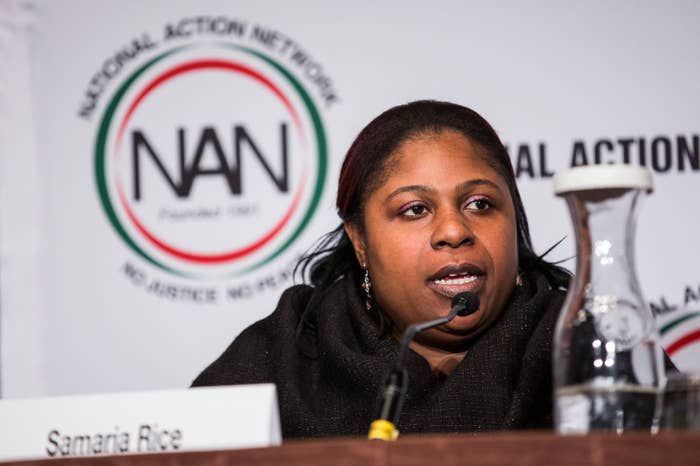
WASHINGTON — The Justice Department on Friday notified the family of Tamir Rice — the 12-year-old boy who was shot and killed by a Cleveland police officer in 2014 — that officials would not reopen a federal civil rights investigation that closed in December 2020.
Rice’s family last year launched Tamir’s Campaign to urge DOJ officials under the new administration to revisit the Trump-era decision. Assistant Attorney General Kristen Clarke, the head of the Civil Rights Division, wrote in a letter dated Jan. 28 to an attorney working with the family that the child’s death was a “tragic loss,” but that they stood by the analysis of career prosecutors who concluded the government wouldn’t be able to prove a federal civil rights violation “beyond a reasonable doubt.”
“The United States Supreme Court has made clear that in prosecuting a Section 242 case, an officer acted ‘willfully’ if he did so with bad purpose — that is, with the specific intent to do something the law forbids — to deprive a person of their constitutional rights. After viewing, and exhaustively evaluating the available evidence in this matter, in 2020, career prosecutors determined that the federal government could not meet this high standard,” Clarke wrote.
Clarke continued, underlining for emphasis, “By no means should you view the Department’s 2020 decision as an exoneration of Timothy Loehmann’s actions,” referring to the former Cleveland police officer who shot Rice.
Clarke wrote that the December 2020 decision to close the matter was “based solely upon the applicable facts and law, without political input or influence,” and that the same was true for the conclusion to not reopen it.
Tamir's mother, Samaria Rice, said she was angry and disappointed.
“I think they're pitiful and pathetic, and at this point no one is going to get justice when it comes to police shootings in America,” she said in a phone interview on Monday. “It’s disgusting I don't have an indictment for my 12-year-old son.”
Tamir had been playing with a toy gun outside a recreation center on Nov. 22, 2014, when police received a report that someone was pointing a gun at people. The caller reported that the person with the gun was "probably a juvenile" and that the weapon was "probably a fake," but that information was not provided to Loehmann and another officer, Frank Garmback, who went to the park.
Loehmann fired two shots less than two seconds after opening the car door. Loehmann, according to a statement the Justice Department released in December 2020, "repeatedly and consistently" said that Tamir was reaching for what looked like a handgun. Both officers testified they had given Tamir "multiple commands to show his hands before shooting."
There was a video of the shooting recorded by a surveillance camera at the recreation center, but the time-lapse footage was grainy and had no audio. DOJ noted that because of the angle of the camera, Tamir’s hands weren’t visible and it wasn’t clear what he was doing right before Loehmann fired his gun.
In late 2015, a grand jury in Cleveland declined to return criminal charges against the two officers. In October 2020, the New York Times reported that DOJ officials had decided more than a year earlier to end the federal probe without pressing charges, but hadn’t yet taken the “bureaucratic steps” to make that official and hadn’t notified Rice’s family or the public. The Times also reported that prosecutors had asked for permission to use a grand jury in the investigation, and that request had been denied.
Following the December 2020 announcement and with a new administration in office, attorneys for Tamir Rice’s family wrote to Attorney General Merrick Garland and other officials last spring urging them to reopen the investigation; they had support from Ohio Sen. Sherrod Brown and three members of the state’s congressional delegation. Samaria Rice and Jonathan Abady, an attorney working with the family, met with Clarke on Oct. 27. Abady also submitted a letter dated Jan. 3 signed by dozens of legal scholars explaining why they believed the actions of the Cleveland police officers involved in Tamir Rice’s death did meet the standard for a federal civil rights charge and why prosecutors should convene a federal grand jury.
Clarke acknowledged the October meeting and the letters, and wrote in response that, “After thorough consideration of this information and the available evidence, the Justice Department’s career prosecutors have concluded that this information does not change its earlier 2020 decision.”
The Justice Department under Biden has promoted civil rights as a top priority and poured more resources into Clarke’s division. The Cleveland Police Department has been subject to a court-enforced consent decree with the Justice Department since 2015 that requires a series of reforms, after a DOJ report in late 2014 found the department had a "pattern or practice" of using excessive force. Last spring, Garland made back-to-back announcements of investigations into policing practices in Minneapolis and St. Louis. Clarke concluded her letter to Abady, “Please know that we remain committed to doing all that we can to promote policing accountability and reform.” A Justice Department spokesperson declined to comment.
Samaria Rice said she would continue to push to keep up public awareness of her son’s case. She was dismissive of Clarke’s pledge for reforms absent federal action against Loehmann.
“Shame on them,” she said.
UPDATE
Updated with information about a consent decree involving the Cleveland Police Department.
